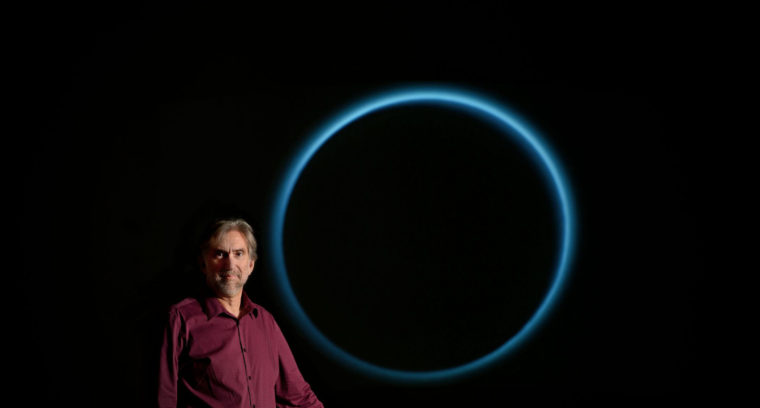William B. McKinnon, professor of earth and planetary sciences in Arts & Sciences, will deliver the McDonnell Distinguished Lecture on Wednesday, March 29, on the Danforth Campus of Washington University in St. Louis.
The talk, “Pluto Explored! NASA’s Epic Voyage to the Edge of the Solar System,” will begin at 7 p.m. in Whitaker Hall, Room 100. Sponsored by the university’s McDonnell Center for the Space Sciences, the event is free and open to the public.
The New Horizons spacecraft, carrying an array of instruments, launched 11 years ago, on Jan. 19, 2006. It swung past Jupiter in February 2007 in a precise maneuver that gave it a gravity boost and sent it speeding toward Pluto. In 2015, it flew by Pluto and its moons, training all of its instruments on these remote worlds. It is now on its way to explore deeper into the Kuiper Belt, a circumplanetary torus of small bodies that are relicts of the birth of the solar system.
McKinnon is deputy lead scientist with the New Horizons geology and geophysics team and has been a senior member of the science team since the inception of the mission to Pluto.
“We have reached Pluto, the last of the classical planets, and the most remote world yet explored by humankind!” McKinnon said. “Far from being dark, cold, and dead, Pluto and its family of moons are bright and variegated, if not gloriously, geologically alive.
“From giant floating mountains of water ice, to mysterious cryovolcanoes, to valleys carved by now-vanished glaciers of solid nitrogen, to towering blades of sun-burnt solid methane, Pluto has expanded the very meaning of geology and the definition of planetoid.”
Small as it is, Pluto has revolutionized our understanding of the early history of the solar system, he said.
McKinnon, who dreamed as a child of exploring distant planets, has been fortunate in his career. For the past 35-plus years, we have seen both the unveiling of the outer solar system and the growing appreciation that there are oceans beneath the surface of many icy worlds — with all that implies for the possibilities of life.
He won the 2014 Gilbert Award from the Geological Society of America for his outstanding contributions to planetary geology and three group achievement awards from NASA. He is a fellow of the American Association for the Advancement of Science. There is even an asteroid named for him.
The McDonnell Center for the Space Sciences, established in 1975 through a gift from aerospace pioneer James S. McDonnell, is a consortium of Washington University faculty, research staff and students, primarily from the earth and planetary sciences and physics departments, both in Arts & Sciences. They are working on the cutting edge of space sciences research.
For more information and parking permits, go to mcss.wustl.edu
